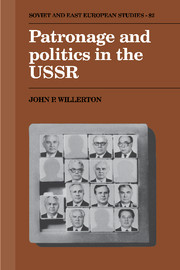Book contents
- Frontmatter
- Contents
- List of tables
- Preface
- Introduction
- 1 The elite, patronage, and Soviet politics
- 2 Networks and coalition building in the Brezhnev period
- 3 Patronage and the Brezhnev policy program
- 4 Patronage, Gorbachev, and the period of reform
- 5 Patronage and regime formation in Lithuania
- 6 Azerbaidzhan and the Aliev network
- 7 The logic of patronage in changing societies
- Appendix
- Notes
- Select bibliography
- Index
- Titles in the series
- Frontmatter
- Contents
- List of tables
- Preface
- Introduction
- 1 The elite, patronage, and Soviet politics
- 2 Networks and coalition building in the Brezhnev period
- 3 Patronage and the Brezhnev policy program
- 4 Patronage, Gorbachev, and the period of reform
- 5 Patronage and regime formation in Lithuania
- 6 Azerbaidzhan and the Aliev network
- 7 The logic of patronage in changing societies
- Appendix
- Notes
- Select bibliography
- Index
- Titles in the series
Summary
Norms of leadership recruitment and coalition formation developed in this study are identified on the basis of a systematic analysis of elite biographies and career précis. The tradition of using collective biographies to analyze coalition behavior and elite politics goes back at least to Lewis Namier's work on British politics of the eighteenth and early nineteenth centuries. His approach allowed him to identify coalitions of individuals and to examine the importance of patronage ties in matters of recruitment and policy. Other scholars followed his example, developing an analytical approach and literature identified as prosopography. Useful for testing hypotheses about populations of elites, prosopography is especially appropriate for studying elite politics in closed societies. The paucity of elite biographical and attitudinal data only reinforces the appropriateness of a systematic investigation of norms and trends on the basis of available aggregated data. For the Soviet Union, minimal career and attitudinal data are available for national officials, while at lower levels elite data are practically nonexistent. Using collective biographies – to the extent that they are available – frees us from undue reliance upon individual cases and enhances the confidence we may have in the norms and trends identified.
In my studies, the political elite is understood to constitute politicians who wield decision-making authority at either the all-union or the republic level: (a) all members and candidate members of the all-union or the republic party central committee (CC), and (b) all members of the all-union or republic party central auditing commission (CAC).
- Type
- Chapter
- Information
- Patronage and Politics in the USSR , pp. 242 - 248Publisher: Cambridge University PressPrint publication year: 1991

